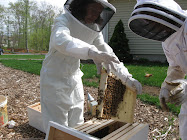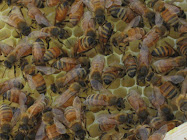BPA that chemical that seeps from our plastic into our food is rearing it's ugly head again in the news. Tongith on NBC Brian Williams reported on it. Here is an excerpt of the "pre-release" on the web and the link to the whole article. Bottom line ... use glass, eh?
.
"We are doing a report tonight on the latest results on the possible danger of a chemical that is very common in our environment. Most of the research up to now has been in mice and rats. This latest study was done in monkeys and indicated possible brain damage at low amounts.
.
The chemical is BPA or bisphenol A. It is found in millions of plastic bottles and other containers. It is back in the news and will be for a while. BPA has been known for decades to mimic the female hormone estrogen. It has also been known that tiny amounts of it can leak into the liquids the containers hold. As a result almost all Americans have tiny amounts of BPA in their bodies. Some animal studies, including the one we cover tonight, indicate it could be a hazard But is it really dangerous to human health? There is no definite answer yet.
But this week the National Toxicology Program, an interagency group set up to advise the government on questions about possibly dangerous chemicals in our environment issued a final report on BPA.
That agency concluded there "some concern for effects on the brain, behavior and the prostate gland in fetuses, infants and children at current exposure levels" Is your plastic bottle safe? by Robert Bazell
.
The chemical is BPA or bisphenol A. It is found in millions of plastic bottles and other containers. It is back in the news and will be for a while. BPA has been known for decades to mimic the female hormone estrogen. It has also been known that tiny amounts of it can leak into the liquids the containers hold. As a result almost all Americans have tiny amounts of BPA in their bodies. Some animal studies, including the one we cover tonight, indicate it could be a hazard But is it really dangerous to human health? There is no definite answer yet.
But this week the National Toxicology Program, an interagency group set up to advise the government on questions about possibly dangerous chemicals in our environment issued a final report on BPA.
That agency concluded there "some concern for effects on the brain, behavior and the prostate gland in fetuses, infants and children at current exposure levels" Is your plastic bottle safe? by Robert Bazell
.
There are many ways ... and very GREEN ways ... to avoid this junk. You could just pretend you are living in the 1930's and you'd pretty much be all set.
But, if you want a list here are a few ideas:
- Buy glass storage containers for your leftovers.
- Use and reuse a metal water container to drink your water -- like SIGG or Kleen Kanteen.
- Get rid of plastic sippy cups.
- If you have access, order you milk locally from the milkman. We get Monroe Dairy here delivered the old fashioned way in glass bottles.
- Buy food stored in glass whenever possible.
- Just look through you life and household for places where your food and drinks run into plastic and ask yourself if you can eliminate it.
- Can or freeze fruits and vegetables - and cook from scratch as much as possible. Unfortunately at some point aluminum cans started being lined with a thin plastic film. The aluminum can lining may actually leech more BPA than a water bottle -- read about it here.
- Make your own yogurt! (more on that later -- easy!)
I've gotta go put dinner on the table, but you get the idea -- right?





























3 comments:
I have been following the BPA story closely as I have a daughter who had been using the Avent bottles for quite some time. I thought there were some plastics (1-5) that did not contain BPA but that it was the hard plastics to be concerned about. I totally agree that getting rid of ALL plastics is the best idea, but just wanted to mention/confirm that BPA isn't in all. Right?
Plastics 1-6 contain phthalates which have also been shown to leech into what it contains and causes health problems - particularly when heated. I've read numerous places that #5 is especially bad (a lot of disposable sippy cups and "toss out" tupperware is made of this) when heated -- like in the microwave or dishwasher. Check out my entries under "plastics" there is info on phthalates there. Crazy isn't it? Be well.
Thanks for that info - especially since #5 is one of the most prevalent plastics. I guess I have more cleaning to do in my cupboards!
Post a Comment